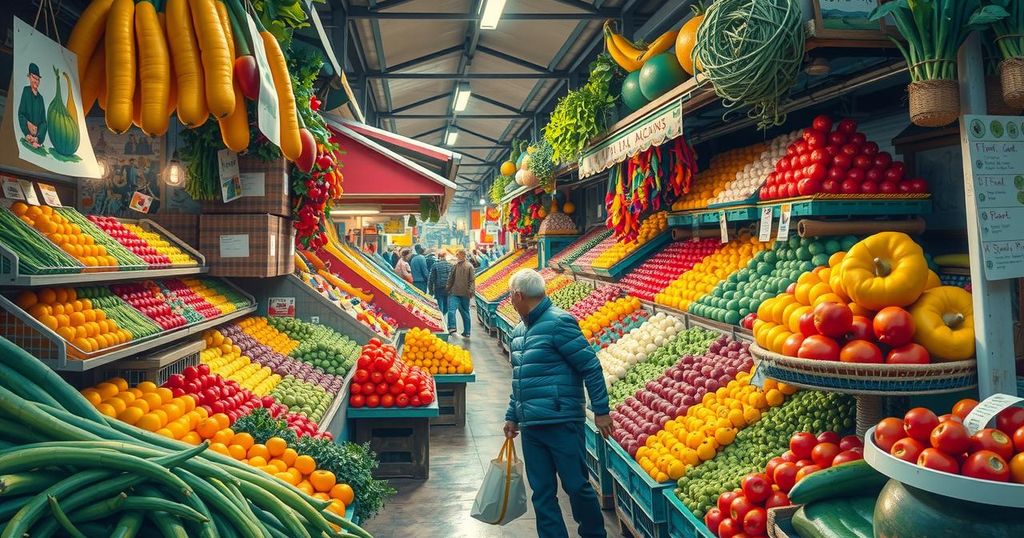South Africa’s food sector is poised for significant changes as economic recovery unfolds, driven by improved GDP growth and interest rate reductions. Food retailers like Shoprite are expected to benefit significantly from inflation pressures anticipated in 2025, while producers may face challenges. Shoprite leads in market performance, whereas Spar and AVI are seeking strategies to navigate current obstacles. Tiger Brands is optimistic about future growth, underlining strategic realignments as critical to success.
As South Africa’s economy begins to display signs of recovery, the food sector is on the verge of experiencing significant changes. Factors such as decreased interest rates, rising GDP growth, and anticipated cash flow from the two-pot retirement system are expected to enhance consumer expenditure. The critical question arises: will food producers or retailers benefit most from this evolution? Overall, improving GDP, interest rate cuts, and access to savings should bolster consumption and food sector volumes, benefiting producers’ margins as commodity price inflation remains low.
However, food price inflation is anticipated to rise in the first quarter of 2025, which may advantage food retailers as they typically experience a positive re-rating in response to increasing food price inflation, driven by expectations of enhanced relative earnings growth. Shoprite has effectively pressured its competitors, achieving a remarkable 10.4% revenue growth without the need for increased promotional subsidies in a low inflation environment. This success is attributed to newly forged loyalty partnerships and strategic store expansion. While like-for-like growth decreased from 8% to 5.4% in the first half of 2025, strong volume growth persists, contributing to improved gross and operating margins.
Significantly, reduced load shedding costs bolstered Shoprite’s trading profits in the first half of 2025. The company’s strong financial position should strengthen following the anticipated R2.7 billion from the proposed furniture sale. Nevertheless, maintaining capital intensity is crucial for continuing double-digit earnings growth. Overall, Shoprite stands as a high-quality investment in South Africa’s food retail sector, outperforming the general retail market amid recent downturns.
Spar, while presenting a promising outlook for margin recovery and portfolio optimization in South Africa, reported disappointing revenue growth trends in both South Africa and Ireland in its recent 18-week trading update. With only 3.4% revenue growth posted, and a mere 3% like-for-like growth, Spar faced challenges due to closures of 13 stores and decreased promotional activities, alongside irregular supply deliveries impacting operations in Mozambique. On the upside, losses from corporate grocery and liquor stores saw a reduction following improved performance and the closure of underperforming outlets.
AVI also recently shared a more cautious perspective following its 1H25 results, where headline earnings per share grew by 9% year-on-year amidst a mere 1% group revenue increase. The report revealed unexpected performance variations within divisions, with sectors like I&J and Fashion and Personal Care underperforming expectations. Conversely, the Entyce division excelled, demonstrating a striking 44% increase in operating profit. However, management indicated that profit growth might not reflect first-semester gains, advising of potential slowdowns in the coming six months without operational improvements. Despite these short-term challenges, AVI remains a robust long-term investment.
Tiger Brands reported a 3% revenue increase for the four months ending January 31, driven by volume and price inflation. The volume growth can be attributed to strategic initiatives aimed at lowering input costs to maintain competitive price points. In an effort to streamline operations, Tiger Brands announced the sale of its 24% stake in Chilean food producer Empresas Carozzi for approximately $240 million. Management expressed optimism regarding the early signs of recovery within the consumer environment, focusing on volume and profit as key elements moving forward.
In summary, the landscape of South Africa’s food sector is evolving due to favorable economic conditions, including lower interest rates and improving GDP growth. While Shoprite continues to demonstrate resilience and strong market positioning, Spar faces challenges that could hinder growth. AVI is taking a more cautious approach following modest revenue performance, whereas Tiger Brands is focusing on strategic sales and maintaining optimistic growth forecasts. Overall, food retailers may gain a stronger foothold as inflation pressures emerge, fundamentally altering market dynamics.
Original Source: www.zawya.com






